Over the past few decades, herbology has been explored with increasing interest thanks to herbal medicine (in various forms) playing a role in some now iconic books and films. So with Samhain/Halloween on the horizon, and as a qualified herbalist and director of a school of herbal medicine, I thought it would be a bit of fun to have a look at some favourite fictional herbalists and explore the differences (and similarities) between fictional herbology and real-life herbalism.
First, What Is Herbology?
There’s a bit of overlap between the definitions of ‘herbology’ and herbalism/herbal medicine, depending what source you use. Some consider herbology to be focused on magical uses and plant lore, whilst others align herbology more with botany and a historical perspective on the use of herbs, for example, what you can explore in traditional English physic gardens across the UK. With herbalism, also known as herbal medicine, whilst it often explores folklore and symbolism, is a decidedly holistic health practice of weaving together the rest of nature and ourselves via medicinal plants to find, restore and maintain balance at the root, tailored to each individual throughout their health journey. (Read more on that here.) It’s a way of supporting our health without chemicals, but rather with medicines we can make and work with ourselves. It’s a way to take a step out of some of the systems that are not designed to support our vitality. Some people use the terms interchangeably, some don’t. But as there’s always been a bit of mystique around herbology, it’s worth understanding what you’re reading or watching versus what you’re looking for to support your own health in real life.
Herbology at Hogwarts vs. Herbalism at Our School of Herbal Medicine

When many hear the word ‘herbology’, they immediately think of Professor Sprout, Hogwarts, Neville Longbottom and some magical gillyweed, perhaps crossed with a dash of Professor Snape and potions class. Although there are many people who work with herbs via their symbolism in spiritual practices, you may be disappointed (or relieved!) to know working with medicinal plants is not going to cause you to grow gills.
In fact, many of the symbolic or magical properties of a plant are based on their very tangible medicinal properties. Rosemary and lavender for protection? They’re both highly antimicrobial - and who doesn’t want to protect themselves against the latest cold or virus going round? Mugwort to fly on your broomstick into a full moon-filled night sky? Mugwort has an incredible affinity for the female reproductive organs and supports a regular moon cycle. Yarrow for holding boundaries? Humans have been working with yarrow for over 60,000 years to manage the boundaries of blood flow - encouraging circulation versus staunching excess bleeding when needed.
Herbalism at Rhodes Roots & Remedies School of Herbal Medicine explores each herb from many angles - not just the medicinal, but also understanding its tastes and their effect on the body, its energetic properties and qualities (warming/cooling, moistening/drying, tightening/relaxing), which herbs are best transformed into which types of remedies, how to best pair herbs with people and what’s going on in their bodies at the moment, safety, seasonality and more.
Is our cosy, humble yurt in the Yorkshire countryside on the same scale as a Scottish castle? No. But that does mean we have much more intimate cohorts (a maximum of 10 students in each first-year group). And even without the moving staircases, it is definitely a magical setting.
Herbology Time-Travelling in the Scottish Highlands vs. Herbalism in the Present-Day Yorkshire Countryside

Before modern day allopathic medicine, there was herbal medicine. In the Outlander books and television series, the female protagonist, Claire, is catapulted through time after revisiting a stone circle in the Scottish Highlands the day after Samhain rituals in search of an intriguing plant. She is, quite frankly, rather interested in herbology and has a solid foundational knowledge of it. Although she later does more time travel to qualify as a surgeon (apologies for the mini spoiler!), her journey begins as a woman with knowledge of the medicinal uses of herbs combined with battlefield first aid.
In fact, the author did consult a qualified medical herbalist whilst writing her books, so the majority of herbs Claire employs throughout the books are largely accurate (give or take a little creative licence here and there).
What herbology in the Outlander series demonstrates to great effect is how herbal medicine was once the only medicine. It was what was used by everyone, from pot scrubbers to the laird of the castle and clan war chief. Some individuals, like Claire, had more skill and knowledge in their uses and applications than others. Some, like another herbalist character, Geillis, overlapped medicinal skill with darker purposes (reserved for fiction only and strictly unethical for a herbalist in the real world).
If a hand was burnt in the kitchen, a herbal poultice would be applied - the same way and with the same herbs as would be done now. If fever took hold, a herbal tea or steam would be administered to flush it out - the same as today. If trapped wind and bloating were causing digestive discomfort, a herbal tincture or tea would be taken to swift effect - again, the same as herbalists do now.
Whilst we can’t expect to go on a foraging walk or plant identification expedition and end up flung through time into the arms of a historical hunk, what we can do exploring herbology in the present-day Yorkshire countryside is bring this once commonplace knowledge back into our conscious minds and awaken these generations-old skills in our hands once more. Remembering, reclaiming and relearning the knowledge and skills of herbal medicine mean we are able to work with the original medicine every day of our lives, not just to mend a wound, but also to build our resilience and vitality so we are less likely to fall to either common or chronic illnesses as they sweep through society.
Herbology and The Power of Three vs. Herbalism and Personal Empowerment

Whether it’s your first or second time revelling in the 90s, you may or may not have followed the adventures of three sisters destined to become ‘the Charmed Ones’ - the most powerful witches of all time. They came with all the classic witchy paraphernalia - the massive Book of Shadows, the potions, the spells that always rhymed and of course the 90s fashion.
At the beginning of the Charmed television series, the sisters must come together to activate their powers, which had been suppressed in childhood, in order to ‘save innocents’ from a wide array of 90s-styled baddies. Although there are many (cheesy) supernatural elements to their escapades and sometimes a bit of specialist kit, whenever they worked with herbology and made potions, they almost always did it in the kitchen. Not over a cartoonish cauldron, but over a massive stock pot, surrounded by herbs and spices that filled up the kitchen cupboards and covered the counter, right next to the coffee pot. Ingredients like ginger and mugwort were more common than eyes-of-newts or toes-of-frogs. They watched and waited for the perfect consistency or depth of colour to know their concoction was ready. And then they bottled it up and ran around in not-so-sensible footwear with it until it was time for a rhyme.
These three sisters were anything but beholden to someone else’s agenda, and the times when other characters or forces in the series tried to restrict them, they fought back with gusto, calling on the generations of women before them if need be.
Fortunately, we’re not up against werewolves or trolls or other nefarious shape-shifters when we learn herbalism. What we do have in common with those magical sisters is our strength in community. Each cohort becomes a tight-knit group who support each other as they learn, individuals contributing from their own strengths and being bolstered by those of others. Every new cohort is woven into the tapestry of our student and alumni community, sharing experiences, insights, resources and other non-herbal interests across the year groups. When we are strong in community, we are strong in ourselves. And when we have our home cauldrons aka stock pots out to make our herbal remedies, each one of us is empowered. Just like the Charmed Ones, when we know how to work with our herbs, when we know how to uphold the health of our families and ourselves, when we know how to recognise something that’s nourishing for us versus something that’s not got our best interests in mind, we are incredibly powerful.
As for coming together in the yurt to learn together, we tend to leave the stylish footwear behind, opting for wellies, slippers and cosy socks instead.
Whichever fictional character or setting has piqued your interest in herbology, if you’re looking to bring the real-life magic of working with medicinal herbs into your daily reality, you’re very welcome to take the next step on your journey building your knowledge, skills and confidence as a home herbalist with us on our intensive herbalism course - Awaken Herbal Wisdom - which spans all four seasons and gets herbalism both deep into your bones and your daily life. Although it is intense, it’s suitable for a wide range of herbalists, including beginners! You can learn more about our herbal medicine course here. Be sure to put your name on the waiting list to see what the current cohorts are up to and get first access to enrolment before it opens.
Whoever or wherever you imagine yourself to be whilst bringing the real knowledge and skills of herbology into your life, I’m sure you will enjoy the journey!
At Rhodes Roots & Remedies School of Herbal Medicine, our practice of herbalism is rooted in the belief that we must remember, reclaim and relearn our knowledge of our bodies, our autonomy and how to work with plant medicine in order to bring control of our own health back into our families and homes for a sustainable future for ourselves and the planet. Through our intensive herbalism course, we facilitate the development of confident, empowered herbalists, attuned to the messages of their bodies and the natural world. Living the deep wisdom of herbal medicine within themselves, their homes and their communities, they uplift themselves and others, creating a stronger society organically. We do hope you'll join us on your journey!

